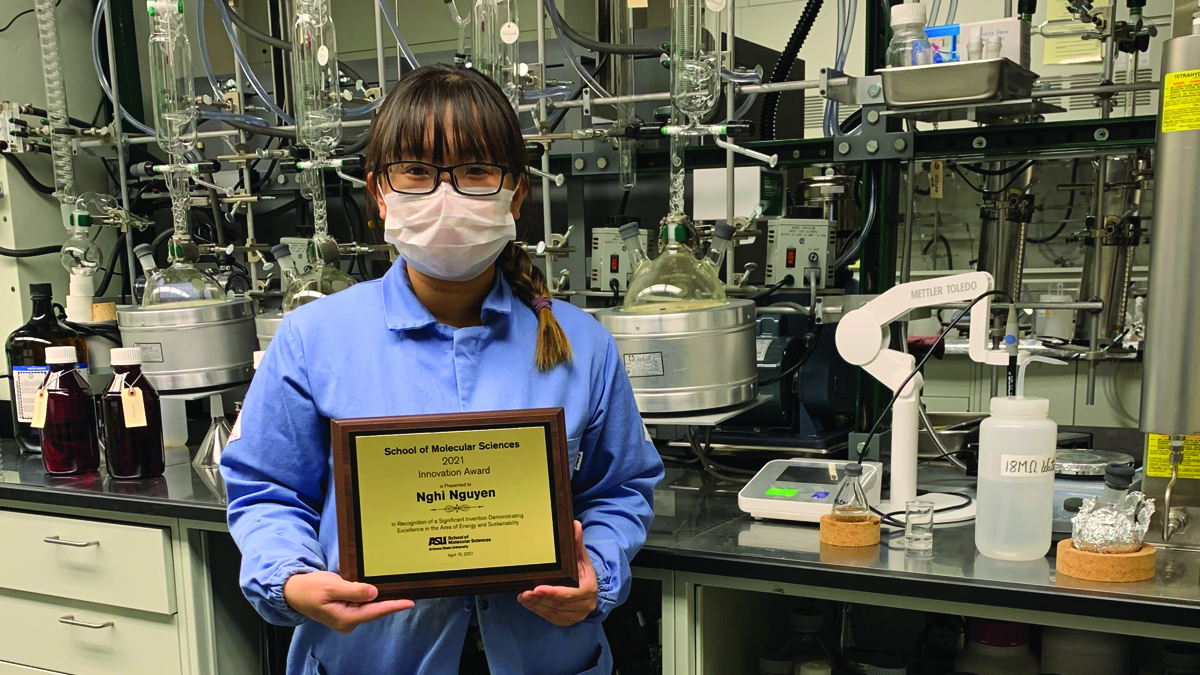ASU Innovation Award recipient proposes new pathway to produce fuels

Nghi Nguyen, School of Molecular Sciences graduate student.
Changing the way the nation generates and consumes energy is at the heart of the recent Arizona State University School of Molecular Sciences’ 2021 Innovation Award.
The winner, graduate student Nghi Nguyen, aims to convert sunlight, water and air into fuels with her proposal.
“Congratulations to Nghi Nguyen on this well-deserved award,” said President’s Professor Ian Gould, interim director of the School of Molecular Sciences. “(The school) continues to be extremely grateful to Emeritus Professor William Glaunsinger and Lorna Glaunsinger for their continued support of this award, which provides our students with a unique opportunity and represents a concrete demonstration of support of the principle 'advancing research and discovery of public value' as given in the ASU Charter.”
The Innovation Award is supported through the ASU Foundation.
"Nghi’s use-inspired research combines efforts across traditional disciplines, including synthetic molecular chemistry, green chemistry, materials science and engineering. She is among the most innovative and motivated students I have had the pleasure of mentoring," said Nguyen's research adviser, Associate Professor Gary F. Moore from the School of Molecular Sciences and the Biodesign Institute Center for Applied Structural Discovery.
“Nghi Nguyen's proposed new synthetic pathway to produce useful hydrocarbon fuels by the catalytic reduction of carbon dioxide on catalytically modified semiconductor surfaces exposed to solar energy shows great promise. I can’t wait to find out if it really works!” Glaunsinger said.
Nguyen describes her research proposal as utilizing materials that convert carbon dioxide to fuels and other value-added chemical products using the power of the sun.
As part of this proposal she aims to initially develop synthetic methods to covalently graft carbon-dioxide-reduction-reaction catalysts onto visible-light-absorbing semiconductors. Secondly, Nguyen will structurally characterize the resulting hybrid assemblies, and finally conduct experiments to better understand the structure-function relationships governing their performance.
Innovations in these areas will enable new technologies for meeting increasing global fuel and material demands while using the principles of green chemistry to minimize environmental impacts.
“Professor Moore has continuously supported my studies, providing mentorship, guidance and encouragement to pursue my research interests, ideas and imagination,” Nguyen said. “His passion for molecular sciences and work ethic inspire me. I am also thankful for the mentorship and advice of Brian L. Wadsworth, a former graduate student in our research group.”
The award is given annually to a graduate student for excellence in achieving the School of Molecular Sciences' mission of discovering molecular-level solutions to real-world challenges through the pursuit of methodology or development of research ideas or inventions.
The award gives the recipient a grant and access to expert entrepreneurial assistance to develop the research idea or invention, along with a commemorative plaque. Nguyen is eligible to receive additional grant funds to advance her invention after a Skysong Innovations evaluation.
Nghi Nguyen holds her 2021 Innovation Award plaque from the School of Molecular Sciences. Photo by Jenny Green
More Science and technology

Diagnosing data corruption
You are in your doctor’s office for your annual physical and you notice the change. This year, your doctor no longer has your…
Large-scale study reveals true impact of ASU VR lab on science education
Students at Arizona State University love the Dreamscape Learn virtual reality biology experiences, and the intense engagement it…

ASU-led space telescope is ready to fly
The Star Planet Activity Research CubeSat, or SPARCS, a small space telescope that will monitor the flares and sunspot activity…


